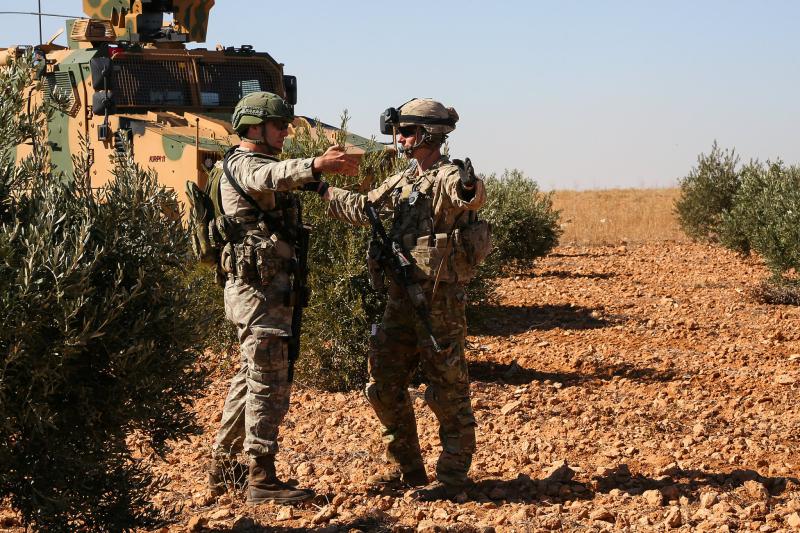
By Wang Yu
“We have defeated ISIS in Syria, my only reason for being there during my Presidency,” said the US President Donald Trump on social media after the US announced its withdrawal from Syria.
However, after several terrorist attacks occurred around the world, people have to doubt Trump’s assertions. Some analysts pointed out that the US withdrawal would ease the pressure on extremist organizations and give them a breathing space. As a result, they will build up their strength and re-grow, posing greater uncertainty for the security situation in the Middle East.
Counter-terrorism gives way to great power competition
The US-led international coalition began air strikes against the so-called Islamic State in Syria without the permission of the Syrian government in September 2014. In November 2015, the US sent ground troops to Syria to support local armed forces mainly in the Kurdish region of northeastern Syria. The US mainly provided training, counseling, and transporting weapons, and promoted the establishment of the Syrian Democratic Forces, making it the most important ground force striking against the so-called Islamic State.
With the cooperation of American air power, the Syrian Democratic Forces quickly compressed the control areas of extremist organizations in the vast areas of eastern Syria. According to data released by the US Department of Defense, the so-called Islamic State lost 98 percent of the “territory” in Syria and Iraq compared with that of its “heyday”. The US has established a number of military strongholds east of the Euphrates River through military actions against extremist organizations in order to compete for the dominance of the Syrian political process.
However, the US foreign policy, especially the Middle East policy, has undergone a major shift after Trump took office. The Syrian war situation was fundamentally reversed with the intervention of Russia. The Syrian government army recovered most of the lost ground and the Bashar regime has become more stable. The status and role of the US have continued to be marginalized.
Consolidating and strengthening relations with traditional allies such as Saudi Arabia and Israel to curb Iran’s expansion of power has been the main line of the Trump administration’s Middle East policy over the past two years. Syria is not the strategic focus of the US in the Middle East. Integrating and adjusting resources to serve the great power competition is also the internal logic of Trump’s Syria withdrawal.
At the same time, Trump’s reason for the Syria withdrawal is not convincing. On the surface, the extremist organization lost all of its grounds. However, a large number of remnants are still recalcitrant. The news of the withdrawal actually buys time for extremists.
According to media reports, extremist organizations launched a “counter-attack” in the area of Hajin in Deir ez-Zoron of eastern Syria on December 21, 2018. Extremist groups launched a car bomb attack in the town of Tal Afar in northern Iraq and also attacked the government’s foreign ministry building in Tripoli, capital of Libya on December 25.
Power vacuum left by major power game
The US and Turkey conducted intensive high-level communications before and after the Syria withdrawal. The two sides reached a tacit agreement on the withdrawal and arrangement after the withdrawal.
After the US Secretary of Defense Jim Mattis, whose resignation has been confirmed, signed an administrative order to withdraw troops from Syria, Trump specifically mentioned on Twitter that he had “long and productive” telephone talks with Turkish President Recep Tayyip Erdogan.
Trump said that the tone of the withdrawal is “slow and highly coordinated.” The Turkish side immediately said that it will continue to crack down on the so-called Islamic State.
France has clearly said that it will not be affected by the US withdrawal from Syria and will continue to maintain its military presence in the Levant region. This reflects the high level of concern about terrorist spillovers in Europe and the formal existence of the international anti-terrorist coalition.
Although the US verbally promised that the power transfer will be “reasonable orderly and in place”, the withdrawal will inevitably lead to the reshuffle and reorganization of all forces because the US is an important weight of the current political balance in Syria.
The withdrawal will inevitably create a power vacuum and a new turmoil. In the process of busy competition for power, extremist organizations will get a breathing time. They will use the contradictions of all parties to develop and grow in the cracks.
At present, Turkey has stepped up its military deployment along the Turkish-Syrian border, and the military operations against the Kurdish armed forces in Syria can start at any time. In particular, the Turkish and Syrian opposition national forces have entered the periphery of Manbij and are waiting for the US withdrawal.
Abandoned by the US, threatened by Turkey, and the facing serious threat to their own security, the Kurdish armed forces have taken the initiative to engage with the Syrian government and handed over the control of the town of Arima in the southwestern part of Manbij. A Russian squad that was stationed in the “Syrian-Russian Coordination Center” west of Manbij also returned. The “head-on collision” of the various forces has made the situation in Syria more complicated and they have no time to watch for the activities of extremist organizations. The Kurdish armed forces also said that if the situation in the region lost control after the US withdrawal, the Kurdish armed forces would not be able to hold the so-called Islamic State prisoners anymore.
Disclaimer: The author is Wang Yu. The article was published on the China's National Defense newspaper on January 2. It is translated from Chinese into English and edited by the China Military Online.









